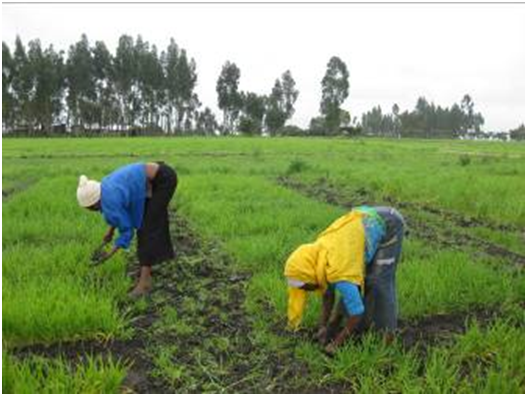Innovative Pilot Scheme Would Match Seeds to the Needs of Women Farmers (Ethiopian Seeds for Needs)


The “Innovative Pilot Scheme Would Match Seeds to the Needs of Women Farmers” (also called “Ethiopian Seeds for Needs”) is one of the winning projects of 2009 Global Development Marketplace: Adaptation for Climate Change. The Development Marketplacehttp://wbi.worldbank.org/developmentmarketplace/competition/2009-global-dm-adaptation-climate-change is a competitive grant program organized by the World Bank, aiming to identify about 20 innovative projects dealing with climate change. The “Ethiopian Seeds for Needs” is one of the winning projects of the 2009 competition (it won an award of $200,000). It was put in place in Ethiopia by Bioversity International, the “world’s leading organization dedicated to agricultural biodiversity research”Bioversity International website: About us.
The Project
“Ethiopian Seeds for Needs” started on the observation that climate change endangers food security in many developing regions of the world, in particular in Africa. Therefore, the goal of the project was to give women farmers “an assured supply of climate-tolerant seeds for food production as climatic conditions change in the future”“Innovative tools to match seeds to the needs of women farmers in Ethiopia” by Ehsan Dulloo on the Development marketplace blog.
Identifying Resistant Seeds
The project was launched in April 2009 and it first consisted in identyfring resistant seeds. Bioversity International worked closely with Ethiopia’s Institute of Biodiversity Conservation (IBC), which safeguards Africa’s oldest gene bank, to identify seeds that would resist drought and elevated temperatures. Durum wheat and barley were selected among 30,000 samples, being considered as having the highest potential for local adaptation. 100 varieties of each crop were then selected to be tested out by farmers using a geographic information system (GIS)What is GIS?.
The Role of Women in this Project
The project was managed in Ethiopia by a women, Alganesh Tesema, the Institute of Biodiversity Conservation team leader. With her coworkers, they planted the 100 varieties of durum wheat and barley seeds at three project sites. Then, they organized meetings with the elder women of each site to follow the evolution of plantations. Thus, this project was a way of empowering these farmer women who lost their local power because of climate change and degradation of the environment. In Ethiopia, women are the primary seed custodians and thus the first concerned with climate change and its threat to food security. Moreover, this project involved all the generation, young female students being in charge of raising local awareness of the project.
Follow-up
Currently, the varieties collected from the field are being analyzed and measured.
The project was featured during the Conference of the Parties (COP16) of the UNFCCC in Cancun, Mexico, that took place from November 29 to December 10, 2010. “Ethiopian Seeds for Needs” was highlighted during Agriculture DayIbid..


